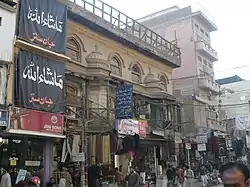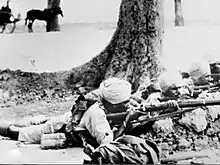Qissa Khwani Bazaar
قصہ خوانۍ بازار | |
|---|---|
Bazaar and neighbourhood | |
 The bazaar still features examples of traditional style architecture. | |
| Coordinates: 34°00′29″N 71°34′12″E / 34.008009°N 71.570126°E | |
| Country | Pakistan |
| Province | Khyber Pakhtunkhwa |
| City | Peshawar |
| Locality | Andar Shehr |
The Qissa Khwani Bazaar (Pashto: قصه خوانۍ بازار, Urdu: قصہ خوانی بازار; "Story-tellers market) is a bazaar in Peshawar, the capital of the Khyber Pakhtunkhwa province of Pakistan.
Background
The Khyber Pakhtunkhwa (then North-West Frontier Province) province Gazetteer,[1] traveller Lowell Thomas[2] and Peshawar's British commissioner Herbert Edwardes[3] called it "the Piccadilly of Central Asia".
History
On 23 April 1930, British Indian Army troops opened fire on a crowd of anti-colonial protestors at the Qissa Khwani Bazaar, killing nearly 400 people. [4] The colonial authorities ultimately acknowledged that the British Indian Army had killed 179 people in the massacre, which triggered protests across India and catapulted the newly formed Khudai Khidmatgar movement into prominence.[5]
In 2010, 25 people were killed in a bomb attack at a protest against electricity shortages.[6] The market was again targeted by militants in 2013, who used a 220 kg bomb to carry out an attack that killed over 40 people,[7] and damaged a nearby mosque as well as set fire to several historic wooden buildings.[8]
On 4 March 2022, 63 people were killed and 196 others wounded in a suicide attack at a mosque during Jumma prayer.[9]
Kissa Khwani Bazaar is famous for Chai and Qehwa houses, and also because several famous Indian movie actors have origins and family ties in the region. Indian film actor Dilip Kumar was born in Qissa Khwani Bazaar on or about 11 December 1922. He belonged to Awan family. Actor Raj Kapoor and his uncle, actor Trilok Kapoor were also born in the area. Actor Shah Rukh Khan's family still lives in the area.[10]
Gallery
.jpg.webp)


 Afghan Building
Afghan Building
 Some older buildings have been renovated and altered
Some older buildings have been renovated and altered British Indian Army soldiers in Peshawar during the 1930 massacre
British Indian Army soldiers in Peshawar during the 1930 massacre
Notable people
- Surinder Kapoor, father of actors/producers Anil, Boney, and Sanjay Kapoor
- The Kapoor family of Bollywood has their roots here after their ancestors left Samundri and settled here before permanently migrating to Mumbai
- Dilip Kumar
- Nasir Khan
See also
References
- ↑ Khyber-Pakhtunkhwa (Pakistan) (1931). Khyber-Pakhtunkhwa (then N.-W.F.) Province Gazetteers.
- ↑ Of Piccadilly and Qissa Khwani bazaar (April 2003) Syed Amjad Hussain
- ↑ Victoria Schofield (2003). Tauris Parke Paperbacks (ed.). Afghan Frontier: Feuding and Fighting in Central Asia (illustrated ed.). p. 46. ISBN 1-86064-895-9.
- ↑ "Peshawar: Qissa Khwani martyrs remembered". Dawn.com. 24 April 2008. Archived from the original on 4 August 2008. Retrieved 24 April 2008.
- ↑ Sarwar, Kazi (20 April 2002). "Qissa Khwani's tale of tear and blood". Statesman.com.pk.
- ↑ Beeston, Richard (20 April 2010). "Taleban put hostages on show as market bomb death toll rises". The Times. London. Retrieved 21 April 2010.
- ↑ "Twin Blasts in Peshwar claim 41 lives". Dawn. September 29, 2013. Retrieved September 30, 2013.
- ↑ "Pakistan car bomb blast: Attack on Peshawar's oldest market kills 37". The Independent. 29 September 2013. Retrieved 7 April 2017.
- ↑ Suicide Bomber, Attack. "Suicide Attack In Peshawar, Mosque".
- ↑ Khan, Omer Farooq (19 March 2010). "SRK's ancestral home traced to Pakistan". The Times of India. Retrieved 19 October 2014.
There is a strong misperception about Shah Rukh's identity who is widely considered as a Pathan. In fact, his entire family speaks Hindko language. His ancestors came from Kashmir and settled in Peshawar centuries back, revealed Maqsood.